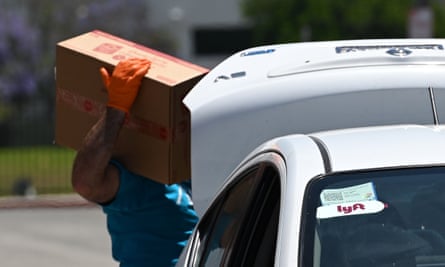Kari Paul reports in The Guardian:
The tech company’s move to sell drivers protective gear rather than provide it resurfaces the debate of whether drivers are employees or independent contractors, and to what extent the tech giants carry responsibility for the work conditions of gig workers. The tech company’s move to sell drivers protective gear rather than provide it resurfaces the debate of whether drivers are employees or independent contractors, and to what extent the tech giants carry responsibility for the work conditions of gig workers.
The ride-hailing platform Lyft has opened an online store to sell masks and other protective gear as the Covid-19 pandemic intensifies, enraging drivers and labor organizers who say the company should be providing these free.The tech company’s move to sell drivers protective gear rather than provide it resurfaces the debate of whether drivers are employees or independent contractors, and to what extent the tech giants carry responsibility for the work conditions of gig workers.California passed a law requiring Uber and Lyft to reclassify its drivers as employees and provide them with benefits and protections accordingly in 2019. But gig companies including Lyft and Uber have resisted the change, modifying their apps in an attempt to avoid the reach of the law. The California attorney general, Xavier Becerra, is seeking an injunction to force the companies to comply.The Lyft store launched on 1 June, a company spokeswoman told the Guardian, and sells the supplies “at cost”, she said.“Lyft does not make a profit on PPE,” she said, adding that Lyft had distributed more than 150,000 sanitizing products and masks to drivers since the Covid-19 crisis began. “The Lyft store is a resource to provide millions of drivers across the US easy access to cleaning supplies and face masks that have consistently been difficult to find.”Still, drivers complain they have shouldered much of the safety responsibilities, and cost. Eden Alva, a driver organizer in the Bay Area, said Lyft should not be charging drivers for the personal protective equipment required to work safely but instead providing it free. Alva quit driving for Lyft in April fearing Covid-19 and watching his wages plummet as more people stayed home because of the virus. He has been without steady work since.“From the start they have pushed all costs, expenses and risks on to drivers while pocketing as much revenue as possible,” he said. “During a crisis like coronavirus, drivers suffer even more, and there isn’t any form of safety net.”Alva said he struggled to find masks and disinfectants early in the pandemic, sometimes resorting to alcohol or bleach when cleaning solutions were in short supply. He watched his wages dwindle to less than $5 an hour as the national shutdown brought ride sharing to a halt, and ultimately quit in April.“I cannot believe that Lyft is trying to sell drivers a way to stay safe when in reality they should not only be providing hand sanitizer and masks, but also be putting up Plexiglass screens to protect passengers and drivers,” said Veena Dubal, an associate professor of employment law at UC Hastings College of Law. “It’s infuriating.”After publication, Lyft announced it would begin to provide partitions to maintain distance between drivers and riders.
Rideshare drivers receive hand sanitizer and face masks at an event organised by the Mobile Workers Alliance. Drivers say Lyft should provide protective gear for free. Photograph: Robyn Beck/AFP/Getty Images As Lyft’s home state of California faces a resurgence of Covid-19, drivers’ concerns are expected to intensify as more people stay home and drivers get less business – especially as the $600-a-week pandemic unemployment stipend the US government is providing is about to expire.Meanwhile, Proposition 22 – a bill to negate the law requiring Uber and Lyft to reclassify drivers – is looming. The ballot measure received $110m from Uber, Lyft, Postmates, Instacart and DoorDash. It would reverse the law passed in 2019 that classifies gig workers as employees, solidifying their place as independent contractors and stripping them of benefits.“As all of the benefits are running out, people are going to be put in a terrifying situation where they’re forced to make a decision of risking their lives to put food on the table,” Dubal said.The PPE issue and ongoing resistance from Lyft to measures like AB5 underscore the public health issues surrounding the sharing economy and the way it handles its workers, Dubal said. A survey in April found that 67% of ride-share drivers were unable to pay rent in May due to the pandemic’s effects on their income, and 68% had not received any gloves, disinfectant or masks from Lyft or Uber.For Alva the creation of the store underscored the company’s inability to provide basic safety supplies to its workers even as it made billions of dollars when it went public in 2019 and as its executives make millions of dollars in salary.“Their investors and their executives make billions, and I expected them in times of need to harness their resources to protect the workers that made all this money for them,” he said. “But instead these wealthy corporations are allowing themselves to completely abuse their workers and put their workforce in higher and higher risk without providing basic protections.”





















1 comments:
Yes, well said. Sanitizers are the real way to get protected by deadly viruses. Thanks for sharing this valuable content in here.
Post a Comment